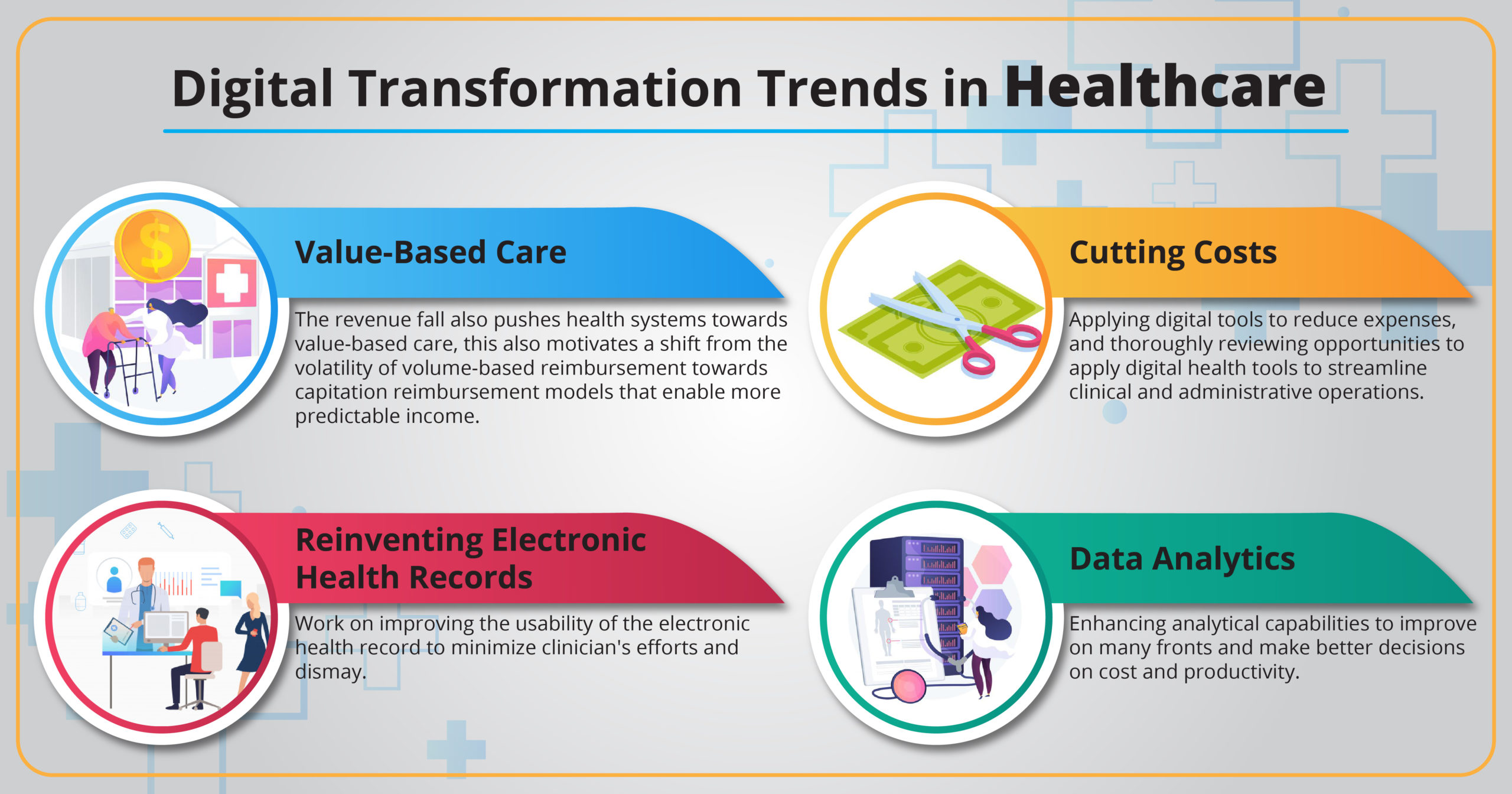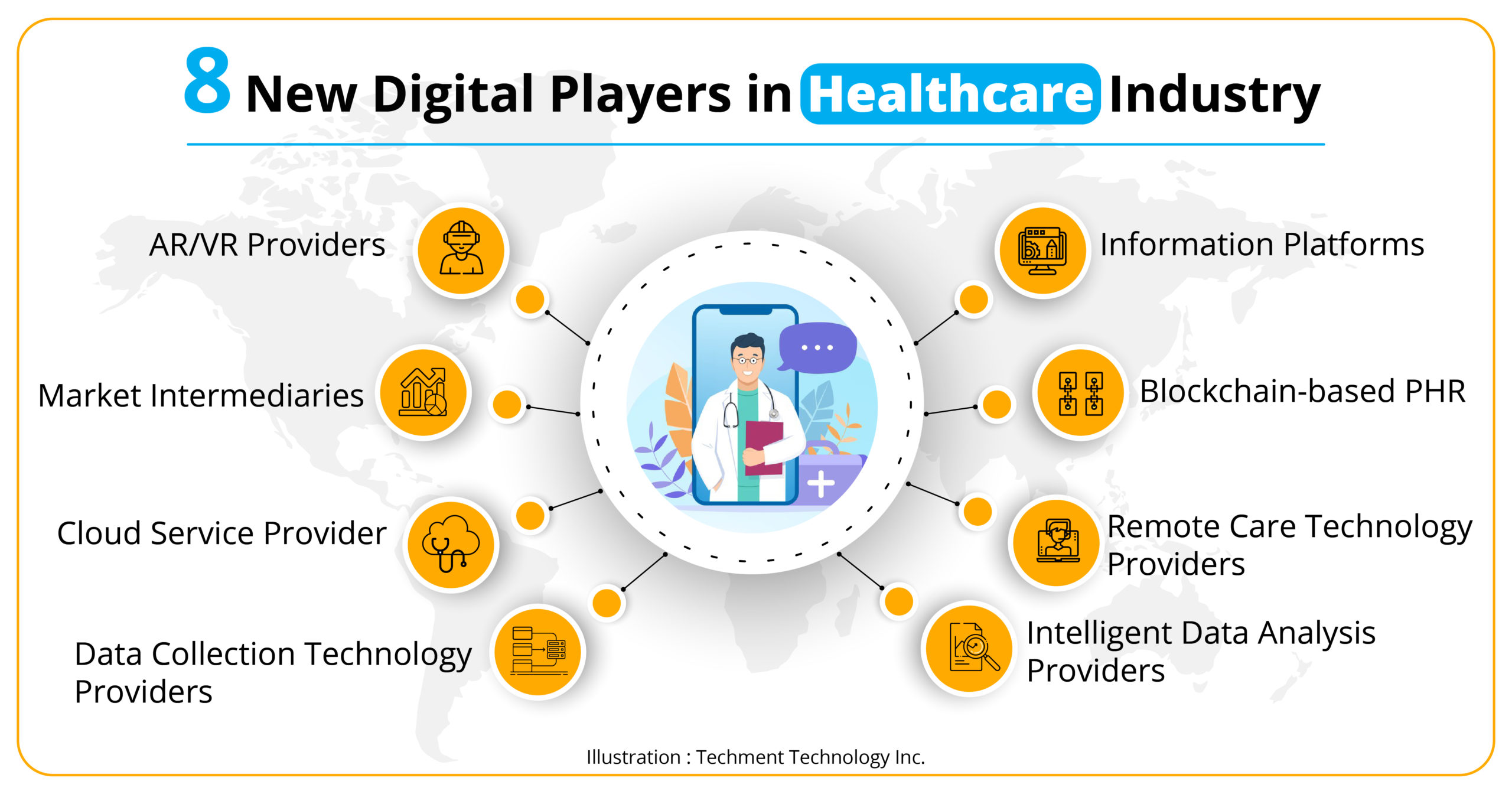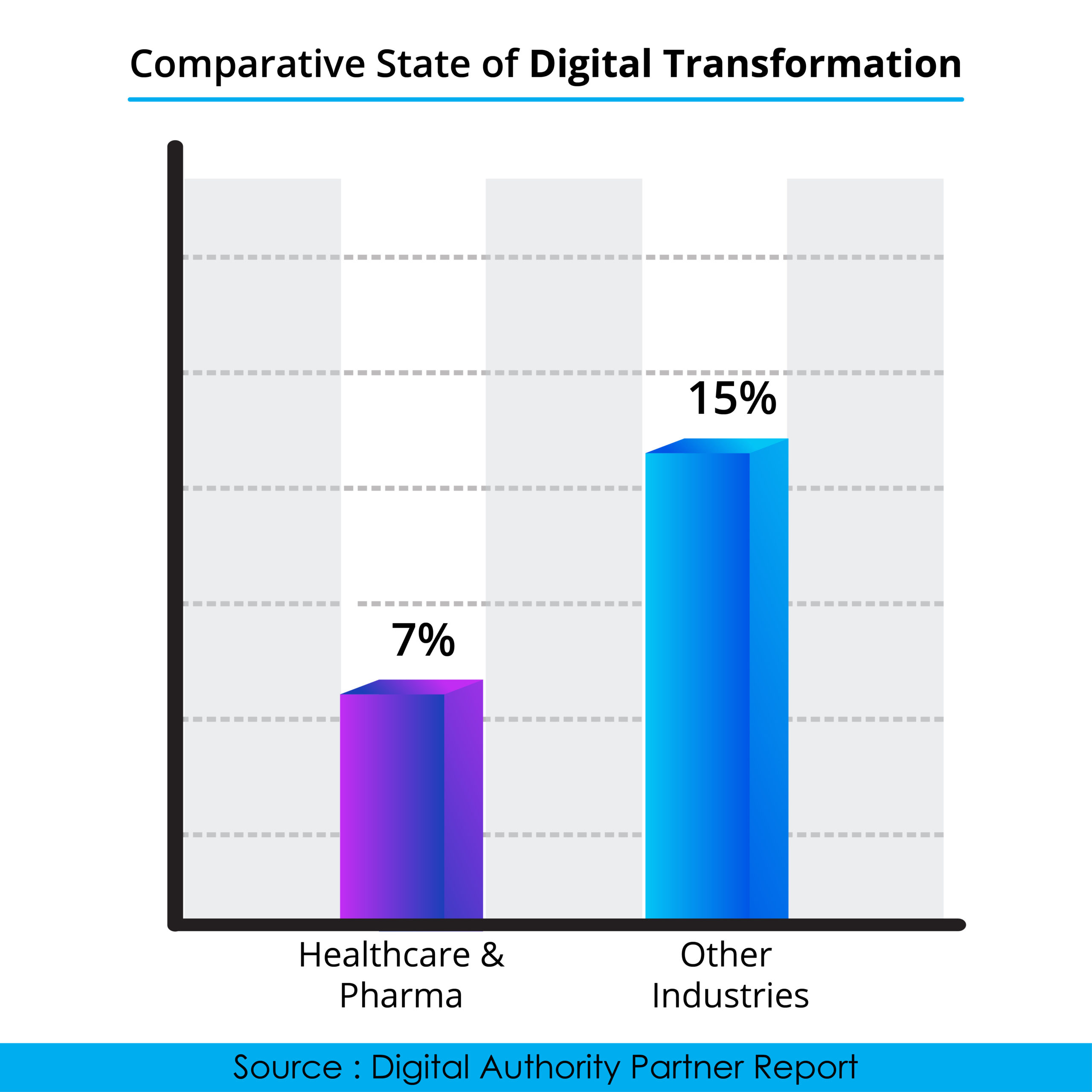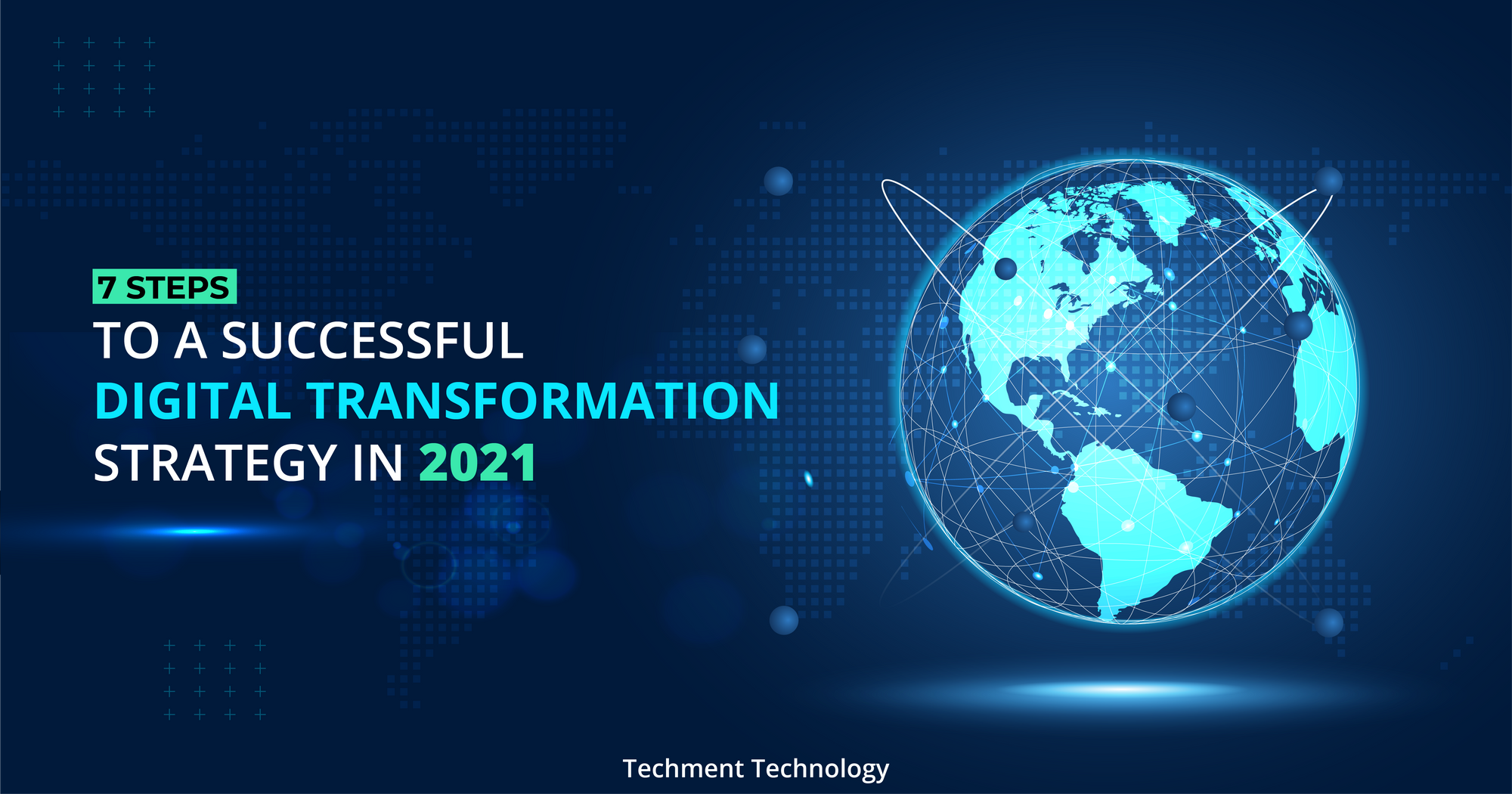The pandemic has impacted healthcare in two ways – it has impacted its ability to deliver care with a traditional delivery model, thus made it resort to technology solutions. On the other hand, the global slowdown has constrained the ability of the governments to reimburse because of large stimulus packages. The double-whammy corners everyone from regulators, providers, and agencies to think about telehealth as a standard part of healthcare in the new normal.
Digital Transformation Trends in Healthcare
The new normal has forced caregivers to think in terms of leveraging digital. Here are the ways organizations are trying to improve:

- Value-Based Care: The revenue fall also pushes health systems towards value-based care, this also motivates a shift from the volatility of volume-based reimbursement towards capitation reimbursement models that enable more predictable income.
- Cutting Costs: Applying digital tools to reduce expenses, and thoroughly reviewing opportunities to apply digital health tools to streamline clinical and administrative operations.
- Reinventing Electronic Health Records: Work on improving the usability of the electronic health record to minimize clinician’s efforts and dismay.
- Data Analytics: Enhancing analytical capabilities to improve on many fronts and make better decisions on cost and productivity.
Impact of Digital Transformation
Slowly Digital is transforming healthcare as it changed other industries.
- New Ecosystems:Digital transformation in healthcare will create inter-organizational partnerships in ecosystems that will co-create value. (Jacobides et al. 2018). Additionally, technological advancements have made services and technology companies the fastest-growing profit pool in the healthcare industry.
- New Players Emerge in Healthcare: Latest research that studied the digital transformation of 1830 healthcare organizations identified 8 new roles within healthcare

- Intensified Competition: The new dynamics intensifies the competition between new entrants and incumbents, will create innovations and contribute to the changing role of patients, transform value proposition and delivery. The areas in which there is a need for digital transformation:
- Process Optimization and Standardization: Digital transformation is a daunting task for any organization, but digitizing sub-optimal processes will not result in gains. Thus, leveraging digital will make hospitals optimize and standardize their operations and processes.
- New Models with Payment Gateways and Options: Most have or are in process of having digital payment options to boost their satisfaction and lower costs, an earlier survey reveals.
- Digitization to Lower Cost Structure: Administrative costs in the U.S. are massive 8% of total healthcare spending vis-a-vis a global average of 3%. Digital solutions can replace with automation the time-intensive, error-prone back-end and collection processes. This presents incredible opportunities to increase efficiency and lower costs for industry stakeholders.
- Awareness and Proactive Steps to Data Privacy and Cybersecurity: Till now, the healthcare community has been wary of data security and privacy. Pandemic has made the advent of digital an inevitable fact, and hence institutions have now moved towards solving the issues than avoiding them.
7 Ways Digital Transformation in Healthcare is Different from other industries

- Healthcare is Slow in Adopting Digital: Only seven percent of healthcare and pharmaceutical companies have gone digital. This is less than half of the other industries in which 15% are digital.
- Regulations and Complexity Barrier: Even if companies want to adopt digital, they can not simply do that, compliance is essential. Also, it is a complex system, hence each change has an effect on many stakeholders and has to be very thought after.
- Interoperability: The benefit of digitization is very limited in siloed systems. This is a big hindrance to companies who want to go digital, but the ecosystem and supply chain is not.
- Connected Devices Privacy concerns. Old medical IoT devices run on outdated operating systems and hardware, which makes them prone to data breaches. Also, it takes IT support to keep them updated and requires a budget, making it challenging to go digital.
- Data Analytics Barrier: The industry is not well suited or equipped to do data crunching, and hence to leverage data will take time for most players as they slowly shift to digital and change it use it productively.
- Patient Experience – New King: Customers have been king in other industries, but not in healthcare. Data and automation give power, accuracy, and efficiency. When more and more healthcare organizations go digital, the basis of competition will shift from cost and expertise to delivering the genuine patient experience.
Combating Digital Challenges in Healthcare
Significant advances in IT have been made in terms of collection, storage, processing, analysis, and distribution of data enabling new forms of healthcare.
- Better data collection with wearables
- Advances in health platforms solving interoperability with data sharing ex., Apple Healthkit and Google Fit
- Cloud Computing is solving storage, processing, and Capex challenges. Amazon Web Services is one such platform
- Advances in AI/ML, NLP help in better analysis and discovery
- Telemedicine and remote care platforms have become highly effective
- Also, progressive policy stance is creating a favorable ground
- Lately, Venture capital and institutional investments are focusing on DX aggressively
The Future of Digital Transformation in Healthcare
Unlike other industries, collective will would play a big part in the healthcare system. From regulators to nurses, each link of the care delivery system will get impacted and will have to change to accommodate the digital. Patients have changed with the pandemic; they want better and more equipped healthcare facilities. Telemedicine with MIoTs may, in the coming years, become a household thing. But the challenges confronting the system are formidable. Regulators need a progressive stance; hospitals need to invest in IT and cybersecurity, and more. But only those who change may find a place in this now an intensely competitive industry.
In short, Patients will become the new focus and will benefit immensely.
 All Posts
All Posts


